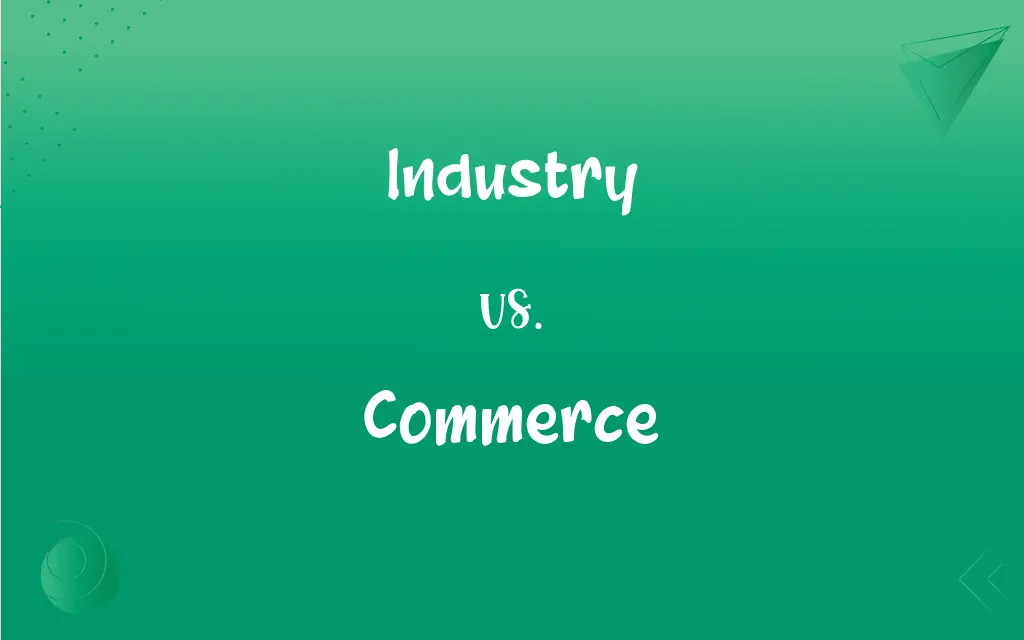Industry vs. Commerce: What's the Difference?
Edited by Janet White || By Harlon Moss || Updated on October 9, 2023
Industry involves the production of goods and services, while commerce focuses on the buying and selling of goods and services. Both are economic activities but differ in their primary functions.

Key Differences
The ecosystem of economic activities curates a varied, intertwined relationship between industry and commerce. Industry predominantly pertains to the production realm, focusing on manufacturing goods or provisioning services. Simultaneously, commerce takes the baton post-production, engaging in the distribution and sale of the manufactured goods, ensuring they reach the consumer markets.
Industry, enveloping manufacturing and service sectors, establishes the base, providing the tangible and intangible items necessary for commerce. Commerce, in its journey, propels these items into various markets, managing transactions and facilitating the shift of goods from producers to consumers, thus acting as the vehicle that mobilizes industrial output to various markets.
Although industry crafts the foundation, it is commerce that ensures the resultant products find a pathway to various consumer and business spaces, often navigating through a network of retailers, wholesalers, and traders. With industry fabricating goods or cultivating services, commerce weaves through the complex web of trade, ensuring the availability of these products and services across varied platforms and locations.
Industry is often visualized through factories, production lines, and services, becoming the backstage where goods are created or services developed. In contrast, commerce surfaces as the front stage, the domain where the products and entities meet consumers, employing marketing, trade, and sales, with an intention to ensure that the products derived from industry find their target audience.
While industry might dwell deeper into aspects of production methodologies, technology usage, and operational processes, commerce navigates through market dynamics, trade policies, and sales strategies. Thus, industry and commerce, while interdependent, operate on distinctive paradigms - the former on production and the latter on distribution and sales, amalgamating to form the backbone of economic structures.
ADVERTISEMENT
Comparison Chart
Primary Focus
Production of goods and services
Buying and selling of goods and services
Key Functions
Manufacturing, producing
Trading, retailing
Physical Representation
Factories, production lines
Shops, markets, online platforms
Economic Role
Creator of goods and services
Distributor of goods and services
Dependency
Relies on raw materials, labor
Relies on industrial output
ADVERTISEMENT
Industry and Commerce Definitions
Industry
A Manufacturing Hub
The automobile industry produces various models of cars annually.
Commerce
Marketplace Dynamics
Global commerce has been significantly impacted by various economic policies.
Industry
Goods and Services Origin
The hospitality industry encompasses services from hotels and restaurants.
Commerce
Economic Interaction Space
Commerce between countries involves intricate policies and regulations.
Industry
A Production Powerhouse
The tech industry constantly innovates to create cutting-edge devices.
Commerce
Business and Buying Activity
The flourishing of local commerce greatly impacts community development.
Industry
Economic Backbone
The steel industry plays a pivotal role in the nation's economic stability.
Commerce
Sales and Purchase Network
With the advent of online platforms, commerce has expanded beyond physical markets.
Industry
Creation and Innovation Zone
The film industry crafts narratives that captivate audiences globally.
Commerce
Trade and Transaction Arena
E-commerce has revolutionized the way we experience buying and selling.
Industry
The sector of an economy made up of manufacturing enterprises
Government regulation of industry.
Commerce
The buying and selling of goods, especially on a large scale, as between cities or nations.
Commerce
Intellectual exchange or social interaction.
FAQs
Does commerce always involve tangible goods?
No, commerce can also involve intangible goods like services and digital products.
What primarily distinguishes industry from commerce?
Industry focuses on production while commerce is centered on trade and sales.
Is industry mainly associated with factories?
While factories are a key component, industry also involves service-oriented sectors.
Can industry function without commerce?
It's unlikely, as industry generally relies on commerce to distribute and sell its products.
Is globalization more impactful on commerce or industry?
Both are impacted - globalization affects production (industry) and trade (commerce) dynamics.
What are common challenges in commerce?
These can include managing supply chains, competition, and navigating economic conditions.
Can an activity be both industrial and commercial?
Yes, for instance, a manufacturing business that also retails its products.
How do governments regulate industry?
Through policies related to safety, labor, environmental practices, and more.
Can commerce exist without industry?
It's improbable, as commerce essentially needs goods or services to trade, which are produced by industry.
How does technology impact industry?
Technology can enhance production processes, improve efficiency, and innovate products in industry.
What is B2B commerce?
B2B (Business to Business) commerce involves transactions between two business entities.
Does commerce always require physical presence?
No, commerce can occur online, not requiring a physical storefront or presence.
Are SMEs a part of industry?
Yes, Small and Medium-sized Enterprises (SMEs) are vital components of industry.
What is international commerce?
International commerce involves trade between businesses across national borders.
How do trade tariffs impact commerce?
Tariffs can affect import/export costs, potentially altering prices and demand in commerce.
Can commerce influence industrial trends?
Absolutely, as market demands (commerce) often shape what is produced (industry).
How important is R&D to industry?
Research and Development (R&D) is crucial for innovation and competitive edge in industry.
Can one be involved in multiple industries?
Yes, a business entity can operate across multiple industrial sectors.
Is the tech sector considered an industry?
Yes, the tech sector is an industry, often focused on software and hardware production.
How does e-commerce differ from traditional commerce?
E-commerce is conducted online while traditional commerce typically involves physical transactions.
About Author
Written by
Harlon MossHarlon is a seasoned quality moderator and accomplished content writer for Difference Wiki. An alumnus of the prestigious University of California, he earned his degree in Computer Science. Leveraging his academic background, Harlon brings a meticulous and informed perspective to his work, ensuring content accuracy and excellence.
Edited by
Janet WhiteJanet White has been an esteemed writer and blogger for Difference Wiki. Holding a Master's degree in Science and Medical Journalism from the prestigious Boston University, she has consistently demonstrated her expertise and passion for her field. When she's not immersed in her work, Janet relishes her time exercising, delving into a good book, and cherishing moments with friends and family.































































